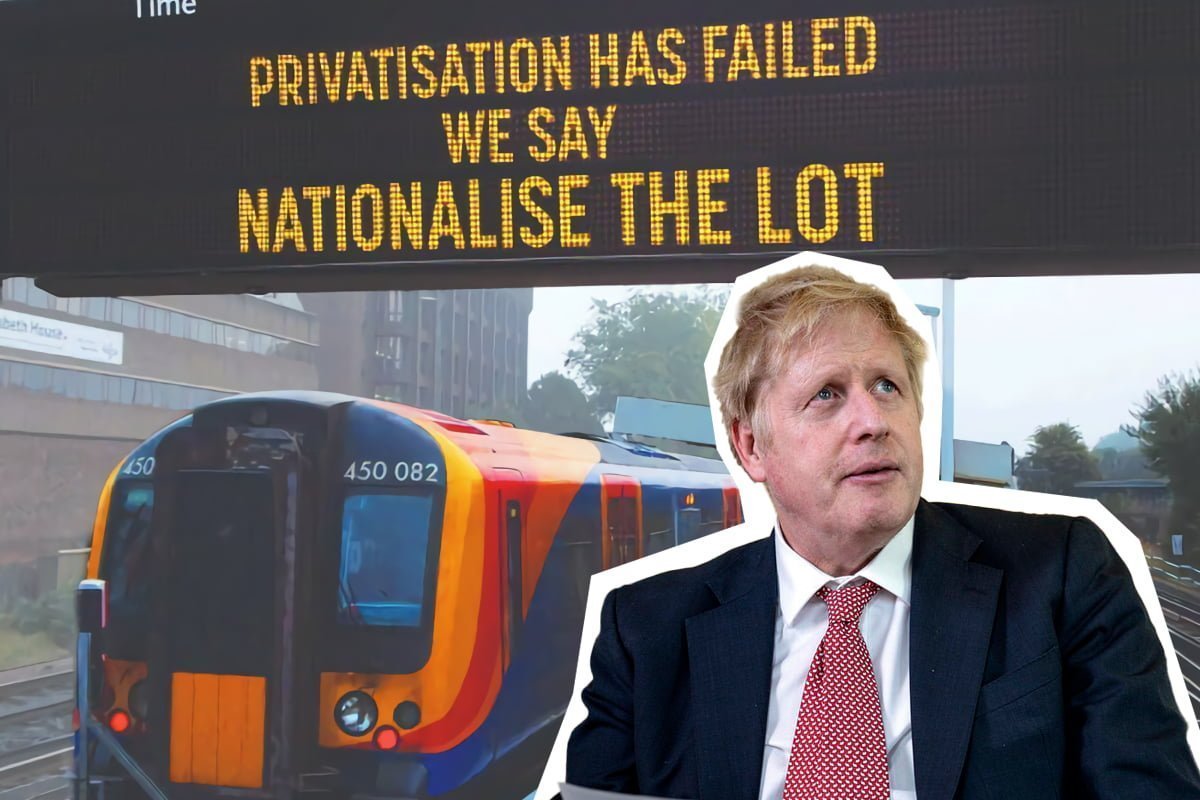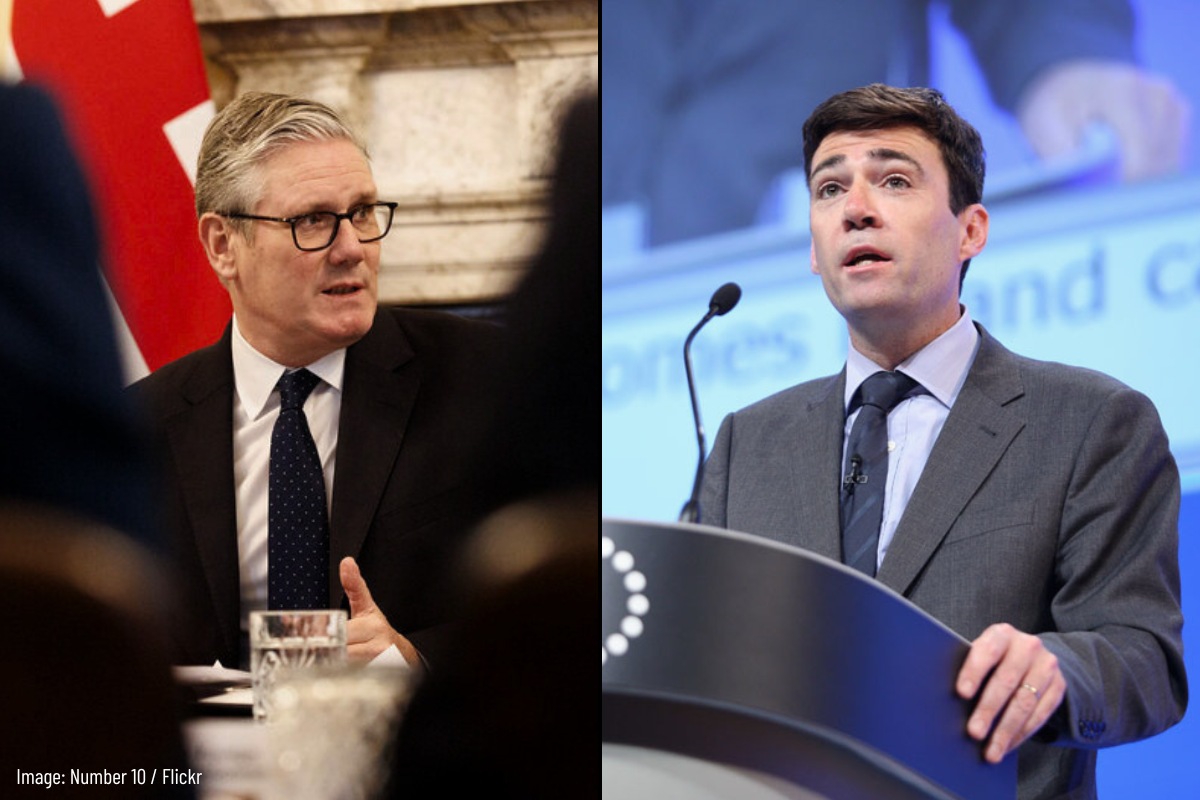The Tories’ new plans for the railways are designed to give the illusion of a return to British Rail. But beneath this new veneer, the same old capitalists are still set to profit. The labour movement must fight for full renationalisation of the system.
The Tories have announced plans to bring all Britain’s railways under the control of a new public body: Great British Railways. Yet despite giving the appearances of a return to nationalisation, the system is still designed to allow a handful of billionaires to profit at our expense.
In their attempts to justify the continued involvement of the private sector, the Tories have again made much of the quality of the sandwiches under the formerly state-run British Rail. But in reality, it is the experience of the privatised system over the past decades that leaves a very bad taste in the mouth.
Failure
 The past 27-years of rail privatisation have been an unmitigated disaster for passengers and workers.
The past 27-years of rail privatisation have been an unmitigated disaster for passengers and workers.
Initially, responsibility for track maintenance was handed to a privately owned company, Railtrack. So poor was Railtrack’s safety record in the 1990’s and early 2000’s, that it had to be re-nationalised in 2002 following a series of fatal train crashes.
While there has since been some investment in the railways, this has been government-funded through the publicly-owned Network Rail – the successor to Railtrack which owns the tracks and most stations.
The writing has been on the wall for the franchising system for years. The COVID-19 pandemic was simply the final nail in the coffin.
For example, the InterCity East Coast franchise has collapsed on three separate occasions during the past fifteen years. The most recent collapse of Virgin Trains East Coast led to the government taking over operations of the line as the London North Eastern Railway.
In February 2020, the Northern franchise collapsed. At the same time, reports were circulating that South Western and TransPennine Express were on the verge of going under.
Just a month later, the pandemic cut across the looming failure of those franchises. The government was forced to suspend franchises nationally as passenger numbers plummeted. The government spent £800m per month to keep the system afloat.
The Tories’ plan for bringing the railways under the control of a single state body is an explicit admission of the failure of the franchising system.
All aboard – for profits!
 We are told the new system will bring benefits to passengers – a nationally unified system with simplified fares. But we can be under no illusions that Great British Railways will be the magic pill that fixes the problems of the rail network.
We are told the new system will bring benefits to passengers – a nationally unified system with simplified fares. But we can be under no illusions that Great British Railways will be the magic pill that fixes the problems of the rail network.
The Tories are keen to give the appearance that the rail network is returning to public hands. Even the old British Rail logo and typeface is to be reintroduced across trains and stations, to give the impression of a unified, nationalised system.
But despite the outward appearances, the railways will continue to be operated by private companies behind the scenes. In other words, the billionaires will continue to pocket their slice of funds from the public purse.
The Tories are proposing to use a concession model, similar to that already used by Transport for London for the London Overground, the Docklands Light Railway and London Buses. This involves operators bidding to run a set of routes, who are then paid a management fee based on service performance metrics in return.
In London this has led to strike after strike, as the private companies try to cut costs – at the workers’ expense of course – in order to increase their profits from their management fees.
Destination: cuts
 On the surface, it may appear that passengers will benefit from the proposed changes. But in reality, they will merely pave the way for cuts to funding and job losses down the line.
On the surface, it may appear that passengers will benefit from the proposed changes. But in reality, they will merely pave the way for cuts to funding and job losses down the line.
Just last December, the government announced that funding to Network Rail for infrastructure improvements would be cut by £1 billion. Now with an expected revenue shortfall of £2.9bn due to the pandemic, there is even greater pressure for cuts.
In the plan for Great British Railways, the government repeatedly states that it is aiming to cut costs. This is a clear attack on the wages and working conditions of rail workers, which the government has had the cheek to call “bloated”.
This argument for cutting costs is disingenuous at best, when during the past year alone, the state has paid out nearly £90m to Train Operating Companies (TOCs) in ‘management fees’.
Similarly, the government has already announced the first of these concession-based contracts for the West Coast Mainline. First Trenitalia is set to make in excess of £30 million a year for the next decade in management fees.
Swindle
 These fees are not going towards improving the railways, running services, or the pay of workers. They are going straight into the pockets of the bosses of these private firms and their shareholders.
These fees are not going towards improving the railways, running services, or the pay of workers. They are going straight into the pockets of the bosses of these private firms and their shareholders.
In contrast, LNER has been publicly-owned and operated since 2018, with all ‘profits’ reinvested in the railway.
Further still, the trains themselves are going to remain in the hands of private Rolling Stock Companies (ROSCOs), as they have done since privatisation in 1994. They are then leased back to TOCs for considerable profit. This set up is simply a further means for capitalists to extract money from the system. Rail unions have already exposed what a rip-off ROSCOs are.
In the past year, one ROSCO, Eversholt, paid out dividends to shareholders in excess of £46m. The cost of leasing trains has increased 77% in the past ten years to £2.9bn in 2019/20 with train companies now devoting 23% of their spending to leasing trains.
For Great British Railways to leave ROSCOs untouched is a disgrace, one to be entirely expected from the Tories of course. Just as TOCs have skimmed a profit off the pandemic and will continue to do so under a concession model, ROSCOs will continue to profit at the public’s expense.
Missed opportunity
The plan for Great British Railways is a classic case of eliminating the risk for private companies by nationalising the losses and privatising the profits.
The government has even proposed allowing for greater control and profits for private companies on certain routes – effectively franchising in all but name!
The failure of the franchise model presented a clear opportunity, indeed a necessity, to fully nationalise the railways. Instead, we are being presented with a Frankenstein model of publicly-owned infrastructure, publicly-controlled but privately-operated railways, and privately-owned trains.
This does little more than to guarantee profits for private companies. At the same time it will threaten safety-critical jobs, and restrict the ability to implement the radical fare reform that is so desperately needed.
Fight for full nationalisation
While it is not yet clear that there will be a reduction in the number of services, this seems very likely given the Tories’ aim to cut costs. The Tories have a clear track record of under-providing essential public services, including transport.
It is also inevitable that we will see renewed attacks on the working conditions, pay and benefits of rail workers, given that the logic of the market is for bosses to maximise profits, usually at our expense.
Indeed, we are likely to see renewed attacks on the role of train guards with a push for Driver-Controlled or Driver-Only Operation as a key means of cutting costs. On all routes, but especially on high-speed InterCity services, this presents a serious risk to public safety.
The labour movement needs to respond forcefully against these proposals, which represent a direct threat to jobs and services.
The vast majority (61% support vs 13% oppose) of the public support the full nationalisation of the railways. This was one of the most popular Labour Party policies introduced by Jeremy Corbyn back in 2017. But given the rapid rightward shift of the party leadership under Keir Starmer, there will be a battle ahead over the future of the party’s programme, including this policy.
The trade unions in the rail industry must prepare for industrial action in order to protect jobs, pay and services. The rest of the labour movement must stand together to fight back against these attacks, which are inevitable in the coming period.
The time has come for us to fight to kick out the billionaire profiteers from our railways once and for all. We must fight for democratic workers’ ownership and control of the railways, to provide cheap and efficient transport for all.






